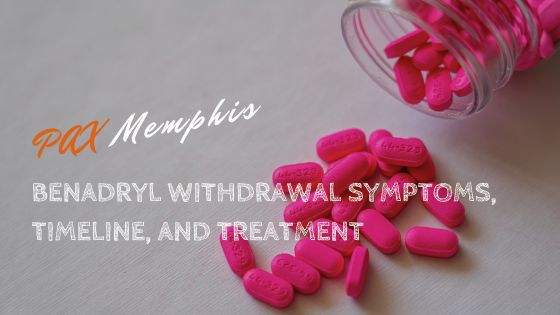Benadryl is the name brand for an over-the-counter medication called diphenhydramine. This medication is an antihistamine that is used to treat the symptoms of allergies and allergic reactions. Some people may use Benadryl off-label for sleep, as it can cause symptoms of drowsiness.
While many people are quick to use Benadryl when their allergies are bothering them, it is not a substance that should be used frequently. When used, Benadryl may cause feelings of relaxation and drowsiness that can lead to dependency. Additionally, taking high doses of it can cause hallucinations, delusions, paranoia, and even life-threatening overdoses that include symptoms of seizures, coma, or death.[1]
If you are addicted to Benadryl, suddenly stopping the use of it can lead to withdrawal symptoms. Diphenhydramine withdrawal may include flu-like symptoms, insomnia, and vomiting, and typically lasts up to one week. It’s always best to be treated for Benadryl withdrawal in the safety of a medical detox center where you will receive medications to limit your symptoms and keep you medically stable.
What are the Symptoms of Benadryl Withdrawal?
While occasional use of Benadryl will not result in dependency, taking the medication regularly or in high doses can result in addiction. Once you are addicted to diphenhydramine, suddenly stopping its use will lead to withdrawal symptoms. While rare, Benadryl withdrawal can result in seizures if it is not properly managed with medications and treatments, making it imperative that you seek support from a medical detox program.
The symptoms of Benadryl withdrawal may include:[2]
- Insomnia
- Anxiety and restlessness
- Irritability
- Flu-like symptoms
- Nausea and vomiting
- Diarrhea
- Increased heart rate
- Excessive sweating
- Tremors or shaking
- Panic attacks
- In rare cases, seizures
How Long Does Benadryl Withdrawal Last?
While how long Benadryl withdrawal lasts can vary from person to person, most people experience a similar timeline. Typically, the symptoms will arise within 12 to 24 hours and can last up to 7 days.
The general Benadryl withdrawal timeline is as follows:
12 to 24 Hours
Within 12 to 24 hours after your last dose of Benadryl, you will begin to experience withdrawal symptoms. The early symptoms of withdrawal are usually mild, however, they may include anxiety, muscle aches, a runny nose, and insomnia.
1 to 3 Days
Sometime between the first and third day of withdrawal, your symptoms will peak. This means they will be at their most severe and you should be receiving treatment from a medical detox program.
Peak symptoms may include irregular heartbeat, high blood pressure, nausea, vomiting, and diarrhea. Thankfully, medical detox programs will administer medications to manage these symptoms, keeping you comfortable and safe.
4 to 7 Days
Around the fourth day of Benadryl withdrawal, your symptoms will slowly subside. It can take up to a week for your symptoms to completely disappear. However, people with severe Benadryl addictions may continue to experience mild symptoms of withdrawal for longer than a week.
How is Benadryl Withdrawal Treated?
Since Benadryl is an over-the-counter medication, many people underestimate the severity of the addiction it can cause. Benadryl withdrawal can be incredibly painful and even dangerous without professional treatment, so you should always seek help from a detox facility.
During detox, you will be assessed to determine your needs. Once this assessment is completed, the medical team will create an individualized treatment plan that is tailored to you.
Typically, Benadryl withdrawal requires a taper, so your dose will be slowly lowered until you no longer need it. Tapering prevents you from experiencing severe withdrawal symptoms while ensuring you do not experience medical emergencies like a fast heartbeat or seizures.
While you are being tapered off of Benadryl, you will be monitored on a 24/7 basis. Nurses will check your vital signs regularly to ensure that you are stable. Additionally, you will have constant access to psychological support from a medical professional, which is often necessary because of the mental health symptoms that Benadryl withdrawal can cause.
Once you overcome your withdrawal symptoms, you will be transferred to an inpatient or outpatient treatment center to receive psychological and behavioral support for your addiction. These programs use evidence-based behavioral therapy, group counseling, and relapse prevention planning to ensure that you are ready to tackle sobriety on your own.
Find Help for Benadryl Withdrawal
If you or a loved one struggles with Benadryl addiction, it’s time to seek help. At PAX Memphis, we can connect you with a top-rated medical detox center that uses clinically proven treatments to ensure that you are armed with the tools and techniques necessary to overcome Benadryl withdrawal.
To learn more about how we can help, contact PAX Memphis today.
References:
- The Food and Drug Administration (FDA): Benadryl (diphenhydramine): Drug Safety Communication – Serious Problems with High Doses of the Allergy Medicine, Retrieved November 2023 From https://www.fda.gov/safety/medical-product-safety-information/benadryl-diphenhydramine-drug-safety-communication-serious-problems-high-doses-allergy-medicine
- The National Library of Medicine (NLM): Chronic diphenhydramine abuse and withdrawal, Retrieved November 2023 From https://www.ncbi.nlm.nih.gov/pmc/articles/PMC5874453/
Medically Reviewed: September 25, 2019

All of the information on this page has been reviewed and verified by a certified addiction professional.










